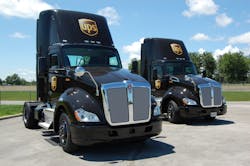Fleet Manager: Mark Collins
Company: United Parcel Service
Operation: Caring for 280,631 pieces of equipment in the U.S., including 80,231 package-car delivery units and vans, plus 20,789 Class 8 units and yard tractors
PROBLEM:
Cleaning diesel particulate filters (DPFs) is a critical maintenance task for any truck fleet. Those devices are designed to capture the soot emanating from diesel engine exhaust that must be removed to keep the filter from clogging.
The process of burning that accumulated soot within the filter is called regeneration, which is where the temperature within the filter is raised to reduce that soot into ash.
Now, that ash eventually must be removed from the DPF, leaving it ready for reuse—a process that needs to be done carefully. DPFs typically cost $5,000 per unit and are made with ceramic substrates, which can fracture if handled too roughly, requiring the DPF to be replaced.
Usually, DPF cleaning requires heating the filter and then using compressed air combined with a vacuum system to push the ash out of the unit and into a sealed container, a process Mark Collins, UPS fleet manager, called the “bake and blast” method.
Yet Collins said Big Brown found that this bake and blast method created problems. In October 2016, UPS found itself suffering a DPF “fallout rate” of 51%, meaning over half of the fleet’s DPFs were being scrapped due to cracked substrates (59%), damaged housings (15%), substrates (1%), contamination (75%), and flow issues (8%) relating to restricted air flow through the device—leading to reduced fuel economy. What to do?
SOLUTION:
To address this issue, UPS decided to add what’s called a “wet wash” system for cleaning its DPFs, a process that helped remove softened ash from its devices more gently, preventing damage to both the DPF’s housing and substrate, while more thoroughly cleaning out individual cells within the substrate to improve air flow when reinstalled.
When UPS started testing its wet-wash DPF cleaning system in the fourth quarter of last year, Collins said, it found the process removed an extra half-pound of ash from the devices compared to the bake and blast method alone.
By January of this year, Collins noted that Big Brown had cut that DPF fallout rate from 51% down to 37% by adding the wet-wash process to its DPF cleaning protocol. UPS also witnessed a 2% to 25% improvement in the final stage cleanliness of its DPFs by moving to a bake-air-blast wet wash cleaning process.
“We’re still evaluating this new method,” Collins added. “We’ve also started using a scrapping process for the bad ones [DPFs] we still need to take out of service, collecting the precious metals within the [scrapped] DPFs, which has helped level out our costs.”
About the Author
Sean Kilcarr
Editor in Chief
Sean Kilcarr is a former longtime FleetOwner senior editor who wrote for the publication from 2000 to 2018. He served as editor-in-chief from 2017 to 2018.
